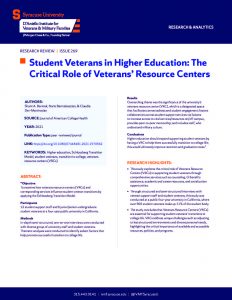ABSTRACT:
“Objective
To examine how veterans resource centers (VRCs) and corresponding services influence student veteran transitions by applying the Schlossberg Transition Model.
Participants
12 student support staff and 6 junior/senior undergraduate student veterans at a four-year public university in California.
Methods
In-depth semi-structured, one-on-one interviews were conducted with diverse group of university staff and student veterans. Thematic analyses were conducted to identify salient factors that help promote successful transition to college life.
Results
Overarching theme was the significance of the university’s veterans resource center (VRC), which is a designated space that facilitates connectedness and student engagement; fosters collaborations across student support services via liaisons to increase access to vital services/resources on/off campus, provides peer-to-peer mentorship; and includes staff, who understand military culture.
Conclusions
Higher education should expand supporting student veterans by having a VRC to help them successfully transition to college life; this would ultimately improve retention and graduation rates.”
RESEARCH HIGHLIGHTS:
- This study explores the critical role of Veterans Resource Centers (VRCs) in supporting student veterans through comprehensive services such as counseling, GI benefits assistance, academic and career resources, and socialization opportunities.
- Through structured and semi-structured interviews with veteran support staff and student veterans, this study was conducted at a public four-year university in California, where over 500 student veterans make up 11% of the student body.
- The study concludes that Veterans Resource Centers (VRCs) are essential for supporting student veterans’ transitions to college life. VRCs address unique challenges such as adjusting to less structured environments and diverse personal needs, highlighting the critical importance of available and accessible resources, policies, and programs.

